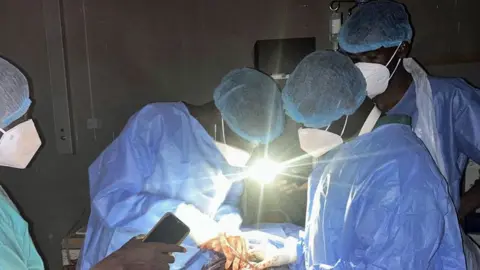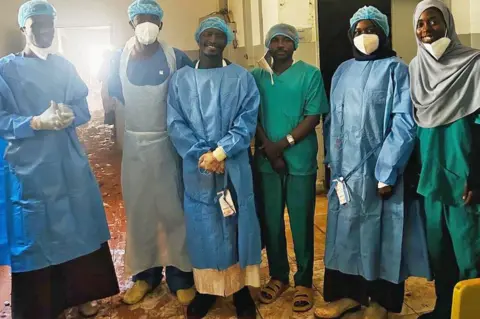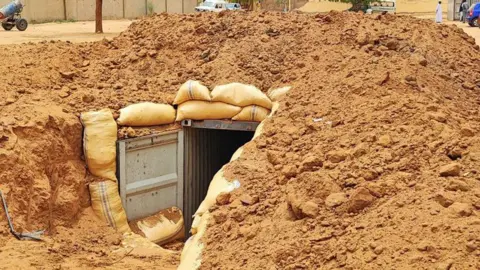The last surgeons standing in the city’s only hospital

 Mudathir Ibrahim Suleiman
Mudathir Ibrahim SuleimanDr. Mustafa Ali Abdulrahman Ibo and his colleagues bravely operated under bombardment at the last remaining hospital in el-Fasher, a town that has been under siege for nine months in the Darfur region of western Sudan.
In the past month, the hospital has recorded 28 deaths and more than 50 injuries among its staff and patients as a result of the bombings. This is the highest number of casualties recorded in a month since the siege began.
“The latest ongoing attack against the Saudi Hospital is very intense, it has become part of our daily life,” Dr Ibo, a Darfuri who has lived in el-Fasher since 2011, told the BBC.
He said the scariest day was when a team of doctors were performing emergency surgery as they were bombarded – nearly killing all of them.
”The first one hit the wall of the hospital… [then] another shell hit the operating room for pregnant women, the debris damaged the generator, cut off the electricity and put us in total darkness,” he said.
The surgical team had no choice but to use flashlights on their phones to complete the two-hour operation.
Part of the building had collapsed and the room was full of dust and debris scattered everywhere.
Dr Khatab Mohammed, who led the operation, explained the risks.
“The situation was bad, the environment was no longer sterile,” the 29-year-old doctor told the BBC.
“After ensuring our safety and the safety of the patient in the pits, we cleaned him and changed the surgical clothes since our clothes were full of dust and continued with the operation,” he said, adding that the patient could have died due to complications.
After successfully delivering the baby, the doctors moved the mother and baby to another room to recover and then gathered for a group photo.
It was proof of their survival, but Dr Mohammed added: “I thought it might be our last photo, I believe another shell will hit the same place and we will all die.”
They went on to perform two more emergency life-saving operations that day.
 Mudathir Ibrahim Suleiman
Mudathir Ibrahim SuleimanThese doctors – most of whom graduated from el-Fasher University – have not stopped since the outbreak of civil war in Sudan in April 2023.
The conflict has pitted the military against the paramilitary Rapid Support Forces (RSF) and has created a global crisis, forcing more than 12 million people from their homes.
The two rivals were allies – they first came to power together during a coup – but clashed over the internationally-backed plan to transition to people’s rule.
A year of conflict, the siege of el-Fasher began. It is the only town still under military control in Darfur, where the RSF is accused of carrying out ethnic cleansing of non-Arab communities.
The RSF began attacking el-Fasher from three sides and cut off the supply routes. In a report released last month, the UN Human Rights Office said the fighting had left more than 780 people dead and more than 1,140 wounded – most of them gunshot wounds.
Fighting has forced all other hospitals in el-Fasher to close.
The Southern Hospital, which was supported by the medical organization Médecins Sans Frontières (MSF), was the main health center in the city dealing with war casualties.
It was close to the front line and was attacked in June by RSF fighters, who also looted medicine and equipment and beat workers.
The Saudi hospital, run by the Ministry of Health and funded by non-governmental organizations, the UN and MSF, specializes in obstetrics and gynecology but now provides all medical services – the only facility in North Darfur province with surgical capacity.
Amid shortages of medical supplies, equipment and staff, the Saudi Hospital is facing a ”sad situation that violates all humanitarian and international laws and regulations”, its medical director, Mudathir Ibrahim Suleiman, 28, told the BBC.
He recalled how terrifying it was during the recent bombings: “Pregnant women, children and workers were scared and paralyzed, some people were injured and had to clear the debris.
“All the current circumstances force us to consider stopping our work, but women and children have no other place to save their lives other than this hospital,” he said.
“The hospital staff are doing everything they can to save people’s lives.”
All the normal aspects of life disappeared completely in el-Fasher, especially in the northern and eastern parts. The university, for example, operates online learning, with test centers established in safe cities such as Kassala in eastern Sudan.
Due to famine and widespread insecurity, the city has been emptied. About half of the people have sought refuge in the nearby Zamzam camp, where an estimated 500,000 people are now living under conditions of starvation.
A Saudi hospital also operates in the camp, and MSF uses ambulances to deliver emergencies.
But these have also recently come under attack, including an incident earlier this month in which a gunman opened fire on “a clearly marked ambulance with an MSF logo and flag”.
“We are appalled by this deadly attack on a humanitarian aid team doing life-saving medical work when it is most needed,” said Michel Olivier Lacharité of MSF in a statement.
 Mudathir Ibrahim Suleiman
Mudathir Ibrahim SuleimanDr Ibo admitted that it was his colleagues – 35 doctors and 60 nurses at the Saudi hospital – who kept him healthy.
”We lose people every day, and offices and rooms are destroyed, but because of the determination of young workers, we continue to endure.
”We get our strength from the people of el-Fasher – we are its children and we graduated from el-Fasher University.”
Aid agencies warn that one of the most severe maternal and child health emergencies has occurred in Darfur, where some areas are facing military airstrikes.
The World Health Organization (WHO) has called for an end to attacks on health facilities and for compliance with international humanitarian law.
“The sanctity of health must be respected even in war,” WHO’s communications officer in Sudan, Loza Mesfin Tesfaye, told the BBC.
Dr Mohammed, who is originally from Sudan in White Nile State but came to el-Fasher to do medical studies in 2014, also pays tribute to his team who ignored many chances to escape.
“Our souls refuse to leave the people of this city – especially given the terrible conditions we see every day.”
All the addicts, who were communicating through chats and voice notes on WhatsApp, felt focused.
“We are determined to continue saving people’s lives, wherever we can, even underground or under the shade of a tree, we pray that the war ends and there is peace,” said Dr. Ibo.
Additional reporting by Sudanese reporter Mohammed Zakaria
You may also be interested in:
 Getty Images/BBC
Getty Images/BBCSource link




